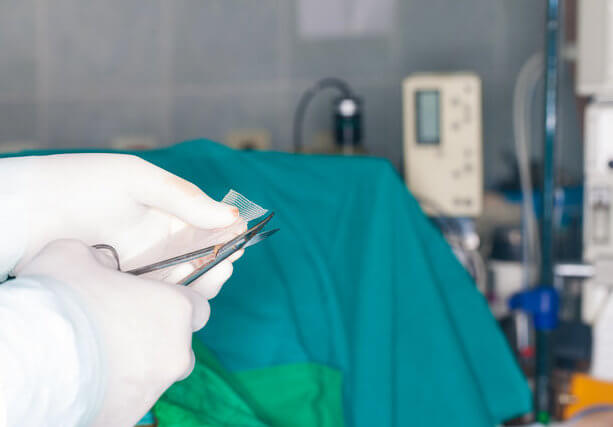Ventral hernias typically present as tissue bulging through an abdominal wall weakness or opening. And while the bulge is usually your first symptom, pain or pressure around that site hernia should soon follow. What’s more, surgery is the only way to repair ventral hernia damage — and it’s better to schedule it sooner rather than later. Here are five things you need to know about hernia mesh surgery and its potential risks.
1. There are usually two types of operations available: open repair and laparoscopic hernia mesh surgery.
Your surgeon’s preferred hernia repair method depends on hernia size, location, and whether it’s a recurrence. Your health, age, anesthesia risks and other related health issues may also influence your operation type. There are two operation types available for ventral hernia repair: open and laparoscopic.
During open ventral hernia repair, your surgeon makes a small incision, then gently pushes bulging tissue back into your abdomen. The surgeon secures tissue in place using sutures, a tissue flap (or a hernia mesh surgery patch for larger repairs). Laparoscopic hernia mesh surgery involves your surgeon making several small punctures into your abdomen. Assistants place surgical tools in ports while your surgeon uses a camera to carefully guide mesh towards the hernia site. Then, your surgeon uses sutures or glue to secure it in place, completing your hernia mesh surgery procedure. Laparoscopic surgery is frequently recommended because it’s minimally invasive and enjoys high success rates.
Related: Get Answers to Your Own Claim Questions
2. There are known ventral hernia risk factors, primarily for older women.
Obese patients, women who gave birth via caesarean section, and people over 45 have higher ventral hernia risks. Any condition that puts stress on your abdominal muscles also commonly leads to ventral hernias. Ventral hernias typically occur near healed incision sites, ultimately affecting 10% of all abdominal surgery patients after recovery.
3. Physiomesh carries a higher recurrence rate than other, similar patches used in hernia mesh surgery.
Laparoscopic hernia mesh surgery comes highly recommended due to the high success rate for repairs. However, when repairs are done with Physiomesh, hernia recurrence risks are significantly higher. A recent European study found Physiomesh patients have much higher recurrence rates than similar hernia mesh surgery patches. In fact, 20% of Physiomesh patients experienced recurrence within six months after undergoing hernia mesh surgery.
4. Any hernia recurrence requires revision surgery to repair additional damage.
The only way to fix a torn abdominal muscle caused by a recurrence is with yet another hernia mesh surgery. According to The British Hernia Centre, “the chances of success actually diminish with each successive attempt at repair.”
5. The FDA approved Physiomesh for hernia repairs without any clinical safety trials.
Physiomesh manufacturer Ethicon did not perform clinical trials on its newest hernia mesh surgery patch before going to market. The FDA approved it via the 510(k) program, meaning Physiomesh shared similar properties with approved existing products. This meant Ethicon (a Johnson & Johnson subsidiary company) didnt conduct clinical trials before securing FDA approval. Pre-market clinical trials may have discovered Physiomesh’s tendency to fail prematurely, resulting in its May 2016 global voluntary recall.
Many hernia patients report serious complications from defective mesh patches, including Ethicon’s now-recalled Physiomesh. Many of them require surgical mesh removal due to punctured organs, infections, bowel obstructions, and other life-threatening health complications. Attorneys are helping individuals with hernia injuries get justice and compensation from device manufacturers.
If you had hernia surgery (regardless of which brand was used), you may be entitled to a cash settlement. To see if your claim may qualify, fill out your free evaluation form today. An experienced attorney will contact you to discuss how to get the financial compensation you deserve.
Related: Woman Needs Plastic Surgery for Hernia Repair Injuries
Mandy Voisin
Mandy Voisin is a freelance writer, blogger, and author of Girls of the Ocean and Star of Deliverance. As an accomplished content marketing consultant, mom of four and doctor's wife, Mandy has written hundreds of articles about dangerous drugs and medical devices, medical issues that impact disabled Americans, veterans' healthcare and workers' compensation issues since 2016.

